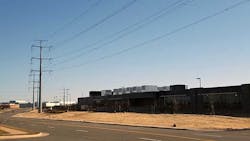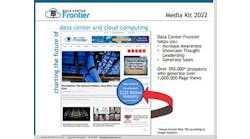Sabey Data Centers plans to expand its data center campuses in Northern Virginia and Central Washington, and has arranged $250 million in financing to support construction. The company said its plans are driven by changes in the wholesale data center market, where demand is strong but customers are seeking the the ability to deploy space quickly.
“The leasing paradigm has changed,” said Rob Rockwood, President of Sabey Data Centers. “Up to the recent past, data center users would move onto a campus and then build out incrementally, on an ‘as needed’ basis. This is no longer the case.”
Sabey said the new construction will allow it to have inventory ready in Ashburn, Virginia and Quincy, Washington. Sabey faces active competition in both markets, including new projects from rivals that are seeking to deliver new capacity within six to nine months.
“From a strategic perspective, this transaction will provide the capital we need to stay ahead of market conditions,” said Rockwood. “The data center development market is extremely active, especially with prospective tenants who are demanding large blocks of inventory as a condition for entering into a lease deal.”
A $675 Million Financing
Sabey announced the expansion as part of a broader $675 million refinancing in which it worked with TD Securities to arrange two five-year loans, including a $425 million term loan and a $250 million revolving credit line. Sabey said the transaction was increased by $50 million amid “meaningful oversubscription,” indicating strong interest from lenders.
The term loan will be used refinance existing property-level debt into a corporate facility, while the revolver will be used to provide capital for data center development. Sabey said the revolving loan could also be used for “strategic initiatives,” a phrase that often suggests that a company might be open to acquiring assets – which is worth noting given that 2017 has been a record year for data center M&A.
Seattle-based Sabey Corp. has more than 25 years of experience in the data center business and is one of the largest operators of hydro-powered facilities in the United States. The company initially focused on commercial development, including office and industrial space for major Seattle corporations like Boeing and Starbucks. Sabey then diversified into data center real estate, as well as technical facilities for life sciences and healthcare.
Sabey Data Centers is a joint venture between Sabey Corporation and National Real Estate Advisors. The company’s real estate portfolio is anchored by four data center campuses in Washington State, including the Intergate.East and Intergate.West developments in the Seattle suburb of Tukwila, the Intergate.Columbia project in Wenatchee, and the Intergate.Quincy project. Sabey’s current tenants include Microsoft Corporation, JP Morgan Chase, Internap, VMware and T-Mobile.
Building A National Footprint
In 2010 Sabey expanded east, acquiring the former Verizon building at 375 Pearl Street in lower Manhattan, which it is developing as a mixed-use asset with both office and data center tenants. It also bought land in Ashburn in 2011, but only began developing the Intergate.Ashburn campus in 2016. The first building opened earlier this year, and Sabey has enough land to build two more data centers on the site for a total of 900,000 square feet of capacity.
Ashburn is the Internet’s boom town. It sits atop the world’s densest intersection of fiber networks, making it an ideal location to store and distribute data. It is unique in its connectivity, and its data centers are laying the physical foundation of the digital economy.
It is also the most competitive data center market in the U.S., with “Data Center Alley” serving as a major hub for the industry’s two largest providers, Digital Realty and Equinix. Virtually every major wholesale data center players has a presence in Ashburn, and many are in active expansion mode.
In a reflection of the intense focus on the timing of new capacity delivery in Ashburn, QTS Data Centers issued a press release Tuesday to provide a construction update on its new Ashburn campus.
“In eight weeks, QTS has erected three stories of steel framing and roofing, constructed the hardened foundation and concrete flooring, and is nearing completion of raising the tilt walls enclosing the facility,” QTS announced, adding that it expects to offer pre-leased customers early occupancy ahead of the Phase 1 completion scheduled for mid-2018.
In this environment, Sabey is now positioned to build additional capacity to have inventory to meet requirements in the fast-moving Ashburn market.






